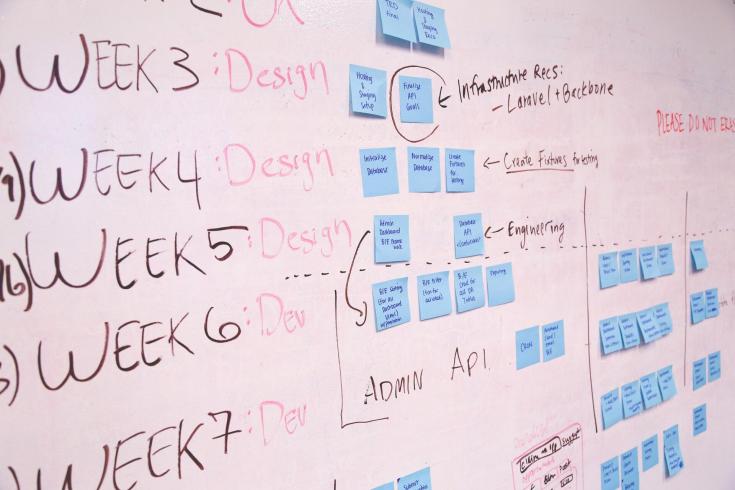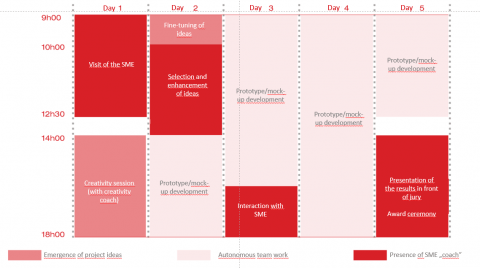In search of new products, new markets or innovative ideas?

In search of new products, new markets or innovative ideas? Many traditional SMEs struggle with finding answers to those questions and do not know where to start with. Businesses in the region of Mayenne, France, have access to an uncommon way to find such answers.
The Challenge and Competencies programme
Challenge and competencies (in French: 'Challenge Compétences') aims at initiating innovation processes in local companies. It is coordinated by Laval Mayenne Technopole, a partner in the Interreg Europe project DEVISE - Digital tech SMEs at the service of Regional Smart Specialisation Strategies.
The practice works on a hackathon-like format: higher education students – in teams of 4 to 5 - are paired with volunteering SMEs and are given a week to come up with innovative digital project ideas that could benefit the company. On an interesting note, the participating SMEs explicitly do not provide the students with a problem to solve but open their doors and minds to the ideas the students come up with. In the specific context of this programme, the innovative ideas developed by the students have a digital component (hardware- and/or software-based).
The one-week programme is structured as illustrated below:

Adapted from www.challenge-competences.fr
The week starts with a visit and detailed introduction to each sparring-business for each students’ team and ends with a presentation of all results and an award ceremony. The results presented by the students have commonly the character of a proof-of-concept of the ideas worked on and provide the basis for new product or services development. Almost 60% of the participating businesses are actually following up on an innovation project initiated during the 1-week hackathon.
The partners
The practice is coordinated by Laval Mayenne Technopole, a triple-helix regional business support organisation with a broad portfolio of business support services. Further key partners are the regional higher education institutions: they include the programme in their curricula and thus make the necessary time available for students. They also support the student teams through coaching and allow them accessing their infrastructure (hardware, labs…) while working on their ideas.
Last but not least, the local authorities Laval Agglomération and Région Pays de la Loire, support financially the programme…
… and of course, one should not forget the SMEs!
Strong evidence of success
Challenge and competencies took first place in 2011 and every year since then. With 2019, it reached its 9th edition, involving 822 students from 7 different higher education organisations in 173 teams. Those figures demonstrate the interest of the higher education community for the programme.
Also, on the business side, the interest remains high over the years: a total of 139 SMEs volunteered to enter this new type of collaboration for initiating innovation processes. 17% of them took part at least twice in the exercise. The share of SMEs investing resources in follow-up activities is quite impressive (60%), especially considering that the practice targets traditional SMEs with an initially low innovation culture.
Lessons learned
The challenge and competencies practice provides an interesting approach for business support organisations to lower the barriers to enter innovation processes. It is also a clever way to bring closer together the regional higher education community and the regional businesses, thus laying the foundations for a better functioning business support ecosystem.
For SMEs it is a chance to get fresh (outsider view) and youthful ideas. It is also an opportunity to scout out young talent that could be invited to internship or to be employed in the future.
For the students, it is a chance to work with a real company, challenge themselves in a more practical format and potentially build beneficial contacts for future employment.
These actions are also relevant for breaking down information barriers about interesting job opportunities in local businesses, and potentially help to retain skilled university graduates in the region.
All of this is achieved with relative low expenses, i.e. about 2.000 – 2.500 € and 20 person-days for one challenge with one higher education organisation.
All those elements confer to the practice a high replication value in other regions and contexts.
Further information is to be found here:
- DEVISE project website
- Challenge and competencies good practice
